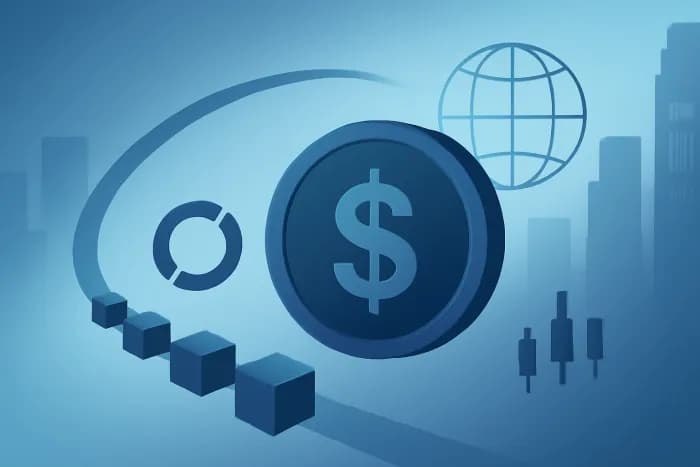Circle Arc Chain Deep Dive: Sub-Second USDC for Wall Street

Title: Circle Arc Chain Deep Dive: Sub-Second USDC for Wall Street
Introduction
Wall Street’s legacy payment rails and siloed capital markets infrastructure often incur settlement times of hours or days—far too slow for the burgeoning demand for programmable money. Circle Arc is purpose-built to change that. This Layer-1 platform delivers deterministic sub-second USDC finality, a native FX engine, optional zero-knowledge privacy, and enterprise-grade compliance tools. In this deep dive, we’ll:
- Explore Arc’s architecture and core modules
- Benchmark its throughput and finality against leading networks
- Examine institutional use cases in cross-border payments, on-chain repo, and tokenized treasuries
- Analyze regulatory alignment under the GENIUS Act
- Outline integration paths for DeFi builders and validator operators
1. Architecture Overview
Arc is engineered from the ground up for stablecoin-native finance, with five foundational capabilities:
- USDC-Native Gas: Fees paid in USDC provide predictable, dollar-denominated costs. Other tokenized currencies (EURC, USYC) can leverage a Paymaster module for multi-currency fee settlement.
- Built-In FX Engine: An RFQ-style on-chain FX module offers 24/7 atomic peer-to-peer swaps, enabling real-time corporate FX flows without off-chain intermediaries.
- Instant Finality: Malachite, a high-performance Byzantine fault-tolerant consensus engine stewarded by Circle, achieves deterministic finality under 350 ms with 20 nodes and under 100 ms with just four validators.
- Optional Privacy: Confidential Transfer uses zero-knowledge proofs to encrypt amounts. Selective disclosure via view keys grants regulators or auditors tailored access without revealing all private data.
- EVM Compatibility: Full support for the Ethereum Virtual Machine lets developers reuse Solidity tooling, frameworks, and Circle’s Smart Contract Platform APIs.
These modules interoperate seamlessly to form a unified, secure, and scalable environment for stablecoin finance.
2. Performance Benchmark
High throughput and low latency are essential for institutional applications. We compared Arc with Solana, Cosmos SDK chains, and R3 Corda:
| Network | Peak TPS | Finality | Consensus |
|---|---|---|---|
| Arc | 3,000–10,000 | <100–350 ms | Malachite (Tendermint BFT) |
| Solana | ~2,900 (mainnet) | ~12.8 s | PoH + PoS |
| Cosmos SDK | ~1,000–10,000¹ | 1–3 s¹ | Tendermint BFT |
| R3 Corda | ~6,300² | seconds (config) | Permissioned (PoA/PoS) |
| ¹ Cosmos SDK chains typically achieve ~1,000 TPS with 1–3 s finality; optimizations can push 5,000–10,000 TPS. ²In a 170-node enterprise deployment. |
Although Solana produces blocks in ~400 ms, its mainnet finality remains ~12.8 s. Arc’s sub-second deterministic finality and predictable USDC gas model directly meet the needs of capital markets, where irreversibility and audit trails are non‐negotiable.
With these performance advantages established, Arc drives real-world institutional applications as follows.
3. Key Use Cases
Arc’s design resolves critical pain points in traditional finance:
- Cross-Border B2B Payments: Instant USDC rails with on-chain FX eliminate correspondent-banking delays. Privacy shields commercial terms, while view-key auditing satisfies regulators.
- On-Chain Repo & Collateral Management: Sub-second DvP between USDC and USYC streamlines repo, margin calls, and liquidity operations without legacy clearinghouse frictions.
- Tokenized Treasuries & Real-World Assets: Fast finality and built-in compliance make Arc ideal for tokenizing U.S. Treasuries, corporate bonds, and equity tokens, enabling near-instant settlement and collateral rebalancing.
These represent the first wave of institutional deployments. Arc’s modular stack can also support programmable commerce, automated stable swaps, and AI-driven financial services.
4. Regulatory Alignment under the GENIUS Act
The U.S. GENIUS Act sets a federal stablecoin framework mandating 1:1 reserves, redemption rights, consumer protections, and licensing. Circle’s compliance posture includes:
- Full cash and Treasury reserve backing with monthly attestations
- State money transmitter licenses in 50+ jurisdictions and pursuit of a federal charter
At the protocol level, Arc embeds compliance primitives:
- Identity & KYC Attestations: Enforce participant KYC on-chain
- Selective Disclosure: View keys grant auditors regulated access
- Immutable Audit Trails: Logs of FX quotes, fees, and settlement times support AML and Travel Rule obligations
This dual approach—commercial privacy plus on-demand regulator transparency—ensures confidentiality for users and confidence for supervisors.
5. Integration Guide
5.1 Developer Onboarding
Arc’s network rollout:
- Private testnet: Q4 2025
- Public testnet: Fall 2025
- Mainnet beta: Early 2026
Teams can prepare by:
- Exploring CCTP bridges for cross-chain asset transfers
- Using Circle’s Developer Console and SDKs for Smart Contract Platform templates, Paymaster modules, and FX engine endpoints
- Deploying Solidity contracts with familiar tools (Hardhat, OpenZeppelin) on Arc’s testnet using USDC gas
5.2 Validator & FX Oracle Opportunities
Validators secure consensus and can host FX oracles, earning fees on bid-ask spreads. Institutions can:
- Operate node clusters
- Provide on-chain price discovery and credit-risk assessments
- Unlock new revenue streams in stablecoin finance
Conclusion & Next Steps
Circle Arc ushers in a new era of instant, secure, and compliant USDC settlement for Wall Street. Its optimized consensus engine, native FX capabilities, and zero-knowledge privacy outclass existing Layer-1 networks in both throughput and finality. Regulatory alignment under the GENIUS Act and Circle’s licensing footprint ensure compliance confidence, while EVM compatibility and developer toolkits lower integration barriers.
Next steps for institutional and developer audiences:
- Join the public testnet this fall
- Build with familiar Solidity tools and Circle’s APIs
- Monitor TokenVitals’ upcoming testnet guide and risk analytics for Arc validators
Arc delivers a clear roadmap to programmable money rails—empowering Wall Street to settle USDC in under a second.